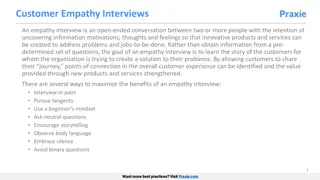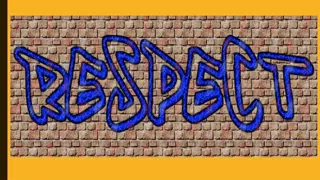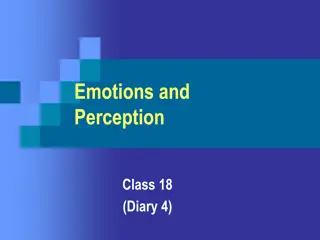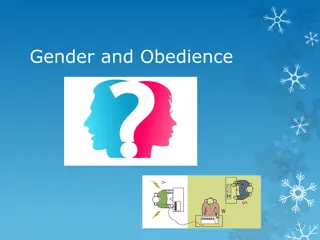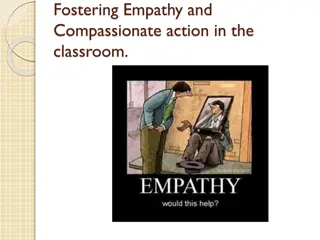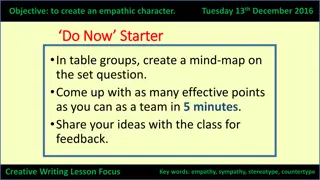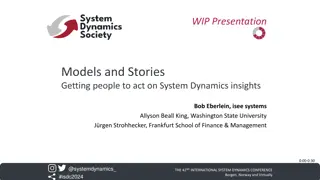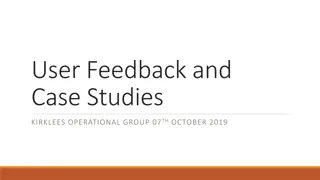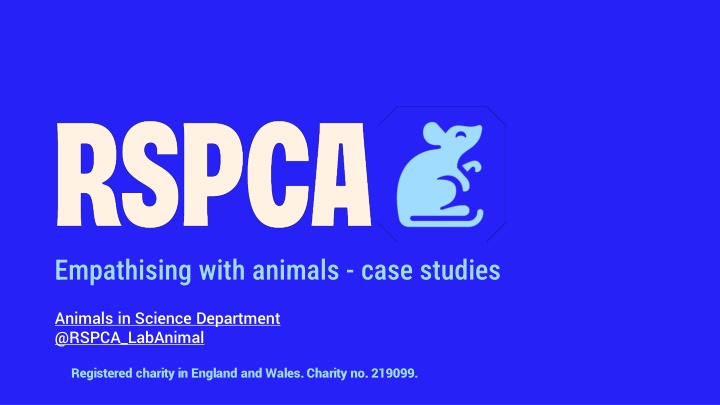
Animal Experiences in Research: A Case Study Approach
This session explores empathy towards animals in research by analyzing case studies involving a mouse, dog, and zebrafish. Participants are encouraged to consider the actions done to each animal, their potential feelings, and ways to alleviate negative emotions. Feedback discussions delve into the ease of empathizing with different species, the attention given to animals' experiences by AWERBs, and personal reflections on contributing to AWERB decisions.
Download Presentation

Please find below an Image/Link to download the presentation.
The content on the website is provided AS IS for your information and personal use only. It may not be sold, licensed, or shared on other websites without obtaining consent from the author. If you encounter any issues during the download, it is possible that the publisher has removed the file from their server.
You are allowed to download the files provided on this website for personal or commercial use, subject to the condition that they are used lawfully. All files are the property of their respective owners.
The content on the website is provided AS IS for your information and personal use only. It may not be sold, licensed, or shared on other websites without obtaining consent from the author.
E N D
Presentation Transcript
Empathising with animals - case studies Animals in Science Department @RSPCA_LabAnimal Registered charity in England and Wales. Charity no. 219099.
Session suggestion: Give each group one animal to consider at a time, with one table printed out per group (for feedback by a nominated person), and enough case studies for everyone to be able to read them Use slides 3 and 4 to explain how to fill out the tables Allow around 20 minutes for discussion, putting up slide 5 at the time to show what you will also be asking about in plenary later Use slides 6 to 8 when asking for brief feedback on the case studies, species by species Use slide 9 for broader discussion (very important) Identify some actions for your AWERB (or AWB, IACUC etc), e.g. further discussion, teach-ins or workshops for all on animal experiences, how to factor more empathy in to project application reviews
Small group discussion - three scenarios Mouse, dog, zebrafish Column 1 - what is done to the animal Interactions and events may be normalised to humans, but very significant to animals, so we need to think about Column 2 - how might the animal feel? Critical anthropomorphism ; begin with how would I feel then apply your animal welfare knowledge Column 3 - how could negative feelings be alleviated?
Feedback - we will be asking you Key points from your discussions about the mouse, dog and zebrafish, also: Do you find some species easier to empathise with than others? Why? Do you think your AWERB pays enough attention to understanding animals experiences? Whose role on the AWERB do you think it is to encourage this? Has this made you reflect on your contributions to your AWERB, within project review or more widely? Do you feel confident about this, and/or how could you gain support? over to you!
The mouse Used to test candidate dementia drug Repeated intraperitoneal injections over 10 weeks EEG recordings from implanted device Behavioural tests including Morris water maze watermaze.org
The dog Used in safety pharmacology tests Implanted ECG transmitter to enable monitoring of heart rate and function Trained to accept oral gavage and standing still in sling Housed in establishment for several years nc3rs.org.uk
The zebrafish Used in a study of myocardial infarct (heart attack) Housed in shoals in bare tanks, fish fed a diet of flake food and live brine shrimp Heart wall damaged with a supercooled probe, under general anaesthetic Repeated measurements taken of electrical activity in the heart using a microelectrode under anaesthetic understandinganimalresearch.org.uk
Do you find some species easier to empathise with than others? Why? Do you think your AWERB pays enough attention to understanding animals experiences? Whose role on the AWERB do you think it is to encourage this? Has this made you reflect on your contributions to your AWERB, within project review or more widely? Do you feel confident about this, and/or how could you gain support?




